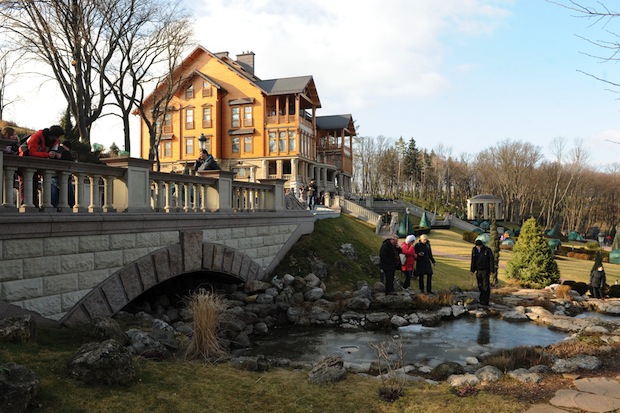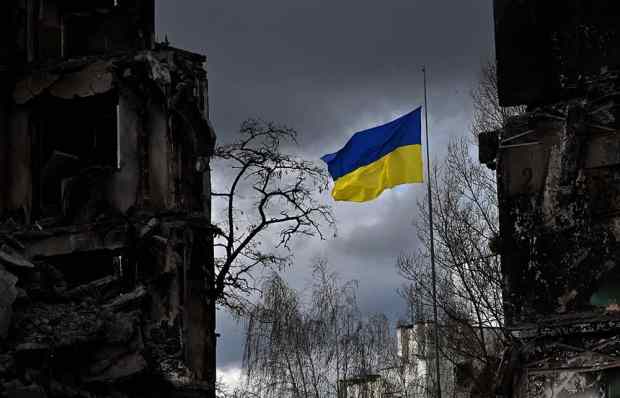The last time Viktor Yanukovych was removed from power in Ukraine, following a corrupt election nearly a decade ago, it was called the Orange Revolution. This time around it should be called the Golden Revolution. Never has an episode of political upheaval been followed quite so sharply by offers of riches from abroad. The past few days have resembled one of those charity auctions where high-net-worth individuals, tanked up after a good dinner, whip out their chequebooks and try to outdo each other’s generosity.
The only differences are that in this case it is our money that they are brandishing, and that instead of going to a children’s hospital or a donkey sanctuary, the money will be going into the black hole of one of the most kleptocratic countries on earth. The best you can say about Britain’s offer of an ‘open chequebook’ is that a little of the money may eventually be recouped by the exchequer in the form of stamp duty, when the oligarchs enriched by our generosity come to spend their money in London’s property market.
The crisis in Ukraine has passed off better than might have been expected ten days ago. Then, a drawn-out civil war was an all-too-likely prospect. Now, the villain is on the run and an emergency government is in control. The snipers have fallen silent and an uneasy peace is just about holding, in spite of reprisals against members of the fallen regime. Russia will be mulling its options, as Anne Applebaum outlines on page 20.
Western leaders are right to extend a cautious welcome to the new government. It cannot be a lot worse than a regime which set snipers around its capital to pick off its own protesting citizens. But to imagine that Ukraine has gone overnight from being a haven of corruption to a model of financial probity that should be trusted with billions of pounds in aid is naive to say the least.
Corruption in Ukraine goes way beyond Viktor Yanukovych and his tawdry palace outside Kiev. The anti-corruption campaigning group Transparency International ranks the country 144th out of 177 countries for financial propriety, putting it on a level with the dodgiest sub-Saharan African republics. Even Russia came only 127th. A report by the UN Convention Against Corruption in 2011 noted a lack of effective laws against corruption and bribery. Admittedly, it is difficult to trust anything that came out of Yanukovych’s offices, but his government recently reported 80 per cent of social security claimants to be on the fiddle. Little wonder the Ukrainian public finances are broken.
In our government’s defence, there is precious little else that Britain can do to help pull Ukraine into the orbit of the free world. What Ukraine’s reformers wanted was membership of the European Union, so the country could hasten along the road of reform and have full access to our markets. It’s a noble aspiration that ought to have been granted — not just to Ukraine, but to Turkey and the other countries that aspire to develop through a common market.
Refusing entrance to the EU club, and offering charity handouts instead, is a cruel rejection of Ukrainians’ ambitions — and it exposes the essential insularity of the EU project. At times, the union looks more like a group of countries clinging together to pretend that globalisation isn’t happening — and which have a rather callous disregard for their neighbours. No wonder Vladimir Putin has been quick to pose as the saviour, the true friend of the country that Europe simply didn’t want.
In offering bribes rather than membership, the EU could be accused of making an underhand attempt to buy Ukraine from beneath the nose of Vladmir Putin. If the money’s going, then Ukraine’s new rulers will, of course, take it. Its claim to the EU earlier this week that it needed €5 billion within three days to stave off economic collapse is predictable. This seems to be the language Brussels understands.
It remains horribly unclear whether the new regime will be better than the old. To hear the acting president, Olexander Turchynov, warning of punishment for ethnic Russians who advocate separatism does not inspire confidence in a peaceful future.
Nor is it clear if he will prevail: we learned from the Arab Spring that the English-speaking, Twitter-literate protesters in the square seldom speak for the country as a whole. Polls show fewer than half of Ukrainians now believe their future lies with Europe — and many are discomfited by the sight of a democratically elected president, however vile, being ousted by the mob. A Russian flag was raised over Sevastopol, the Crimean port, last weekend.
Had the EU held out the genuine offer of membership to Ukraine, there would be a clear incentive for it to strengthen its democratic institutions, to the benefit of all. Brussels missed this opportunity, so can hardly be surprised if so many in this country now look to Moscow. To win Ukraine, the EU must first show that it is not still fighting its own cold war — and does not regard certain ex-Soviet states as lying beyond the pale. As Britain and the EU are about to learn, there are problems that an open chequebook simply cannot solve.
Got something to add? Join the discussion and comment below.
Get 10 issues for just $10
Subscribe to The Spectator Australia today for the next 10 magazine issues, plus full online access, for just $10.
You might disagree with half of it, but you’ll enjoy reading all of it. Try your first month for free, then just $2 a week for the remainder of your first year.














Comments
Don't miss out
Join the conversation with other Spectator Australia readers. Subscribe to leave a comment.
SUBSCRIBEAlready a subscriber? Log in